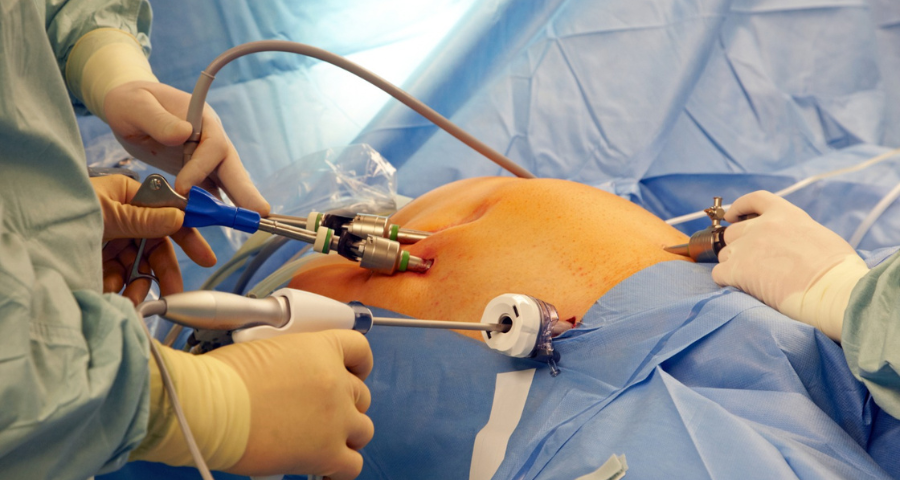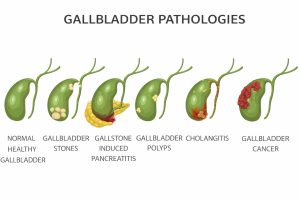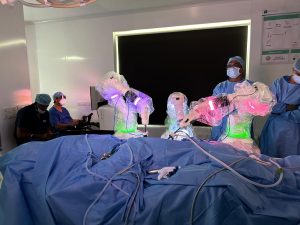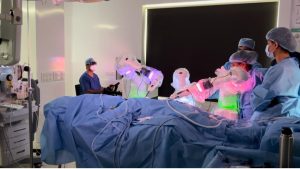Is Bariatric Surgery the only assured weight loss strategy in Morbid Obesity?
Weight Loss surgery
Weight loss Surgery is Also known as Bariatric Surgery. To help you lose weight, this procedure includes making adjustments to your digestive system. This helps people with obesity to lose weight. For patients for whom various weight loss techniques did not work, this procedure is advised. This procedure lowers the risk of obesity-related metabolic illnesses such as fatty liver, diabetes, etc.
Why is it done?
Thanks to bariatric surgery, you may remove the excess weight and lower your chance of developing life-threatening illnesses like heart disease.
Diseases like:
- Heart diseases
- Blood Pressure
- Type 2 Diabetes
- Non-Alcoholic Fatty liver
- Non-Alcoholic Steatohepatitis
- Sleep Apnea
- Respiratory Problems
- GERD (Gastro-Esophageal Reflux Disease)
- High Cholesterol
- Asthma
Types Of Bariatric Surgery
Bariatric Surgery is a combination action of multiple surgeries
- Sleeve Gastrectomy
- Single Anastomosis Duodenum-Ileal Bypass with Sleeve Gastrectomy (SADI-S)
- Gastric Bypass
Some operations restrict the amount of food you may eat, while others make it harder for your body to absorb nutrients. Some techniques perform both.
Is Bariatric Surgery the only assured weight loss strategy in Morbid Obesity?
According to some clinical studies, until 18-24 months after surgery most patients lose weight rapidly. Patients lose around 30-50% of their excess weight after 6 months of surgery, and 70% of excess weight within 12 months
Bariatric Surgery is a team effort of the patient along with your surgeon, dietician, psychologist, nurse, and obesity medicine specialist
Despite the fact that surgery guarantees weight reduction and lowers the risk of serious illness, the patient must maintain good health, increase physical activity, attend all scheduled appointments, take all prescribed medications on time, and take vitamins and other dietary supplements.
Here at Sahasra Hospital, Dr. Srikanth Gadiyaram and team will help you successfully loose weight,provide guidance to maintain a permanent healthy lifestyle and guide you through each step of your journey
Surgical Complications
There are always drawbacks to good efforts
- Excessive bleeding
- Infection
- Hernia
- Small bowel obstruction
Advantages of Surgery
- Significant and maintained weight loss
- Improved Metabolism
- Reduced hunger
- Management of cholesterol and blood sugar
- Long and healthy life
Disadvantages
- Dumping Syndrome: – This happens when your stomach dumps food faster into your small intestine. It can cause abdominal pain, nausea, diarrhea, stomach cramps, etc
- Malnutrition or Malabsorption: – Surgery=is intention is to reduce the absorption of nutrition this may lead to malabsorption which leads to loosen stools and nutritional deficiency
- Bile reflux: – Surgery may cause harm to your pyloric valve. This valve controls the bile movement from your stomach to the intestine. If this valve is hampered then bile that your gallbladder sends to the small intestine to help digest food can backflow into your stomach
- Gallstones: – Rapid weight loss can result in gallstones in 5% of patients
You can schedule a consultation with our highly competent Dr. Srikanth Gadiyaram if you are still worried about your weight, or lifestyle, or whether you should choose weight loss surgery. He has more than 20 years of experience in this field and has assisted thousands of people in leading healthy lives. Contact us to schedule an appointment with us at 8880837000/ 9880105829 immediately.




